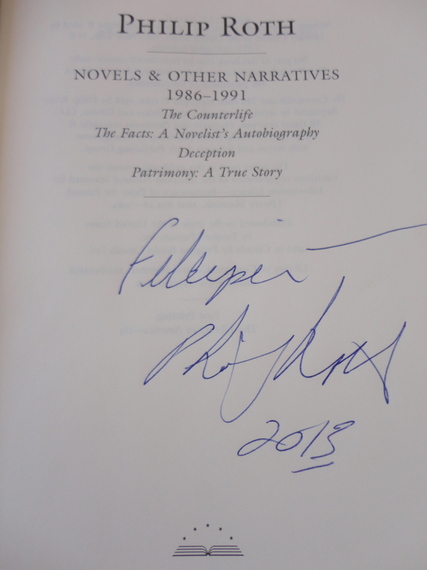While I was writing the novel Mentiras, which is inspired by the works of Philip Roth, I read -- no: I devoured -- from Goodbye, Columbus (1959) to Nemesis (2010). Never imagining that, a couple of years later, I would be literally devouring a slice of Nemesis at Roth's eightieth birthday party. Believe me: Nemesis, then, was a pure and innocent chocolate cake. A very tasty cake, by the way.
But let's talk of another kind of taste -- the literary.
Some of the Philip Roth's novels had more importance in my narrative -- and in my life -- than others. I'll try to list five of them. And I will not affirm that they are the best ones written by Mr. Roth, who wrote several masterpieces (he will live forever in the Pantheon of First Class Authors with Tolstoy and Balzac and Dickens). I can only say that those five were the most impressive for me.
Sabbath's Theater (1995) - "Either forswear fucking others or the affair is over." Sabbath's Theater has a brilliant first line; and more: it's witty and it's bleak, it's deep in its characters; and more: it reveals the reader to himself. Perhaps -- I remember António Lobo Antunes asserting something close to this idea -- that's the greatest quality you find in a book. Well, I'm not ashamed to confess that I found a few traces of my face on Mickey Sabbath's face.
Everyman (2006) - As Sabbath's Theater did, Everyman revealed hidden aspects of myself. The first part of the Nemeses quartet came to me as answers -- as solutions -- to complex textual problems. The gravedigger, for instance, appeared to me as a kind of textdigger. Besides, is bewildering how Roth deals with suffering, old age -- "Old age isn't a battle: old age is a massacre" -- and death in Everyman.
American Pastoral (1997) - Marcelino Freire once declared that he opens up a book expecting to see the worst of humanity. So do I. American Pastoral brings up, perfectly tangled, plenty of disgrace: plenty of human beings. In American Pastoral, Newark is a condemned Yoknapatawpha. All sort of tragedy surround the Levovs' lives. And Roth, with his distinct powerful voice, asks us: "What on earth is less reprehensible than the life of the Levovs?''
My Life as a Man (1974) - My Life as a Man has a magnificent architecture: starts with a short story, "Salad Days"; continues with a second short story, "Courting Disaster" -- independent short stories, but somewhat similar -- and after the finish of "Courting Disaster", the novel de facto begins ("My True Story"): showing the -- real? -- writer, Peter Tarnopol, of those two initial pieces of fiction. Moreover, the disastrous relationship between Peter and Maureen is remarkable.
Deception (1990) -- It was the first Roth novel I read, was the first Roth novel I fell in love with. It changed my life. Deception is the basic structure for Mentiras: dialogues, character Philip, metafiction. When I met Philip Roth, at his birthday party, I took my copy to get his autograph. I'm looking at his signature right now. It's not just an object made of pages and paragraphs anymore, neither a story -- it's one of my most incredible memories: a priceless treasure.
